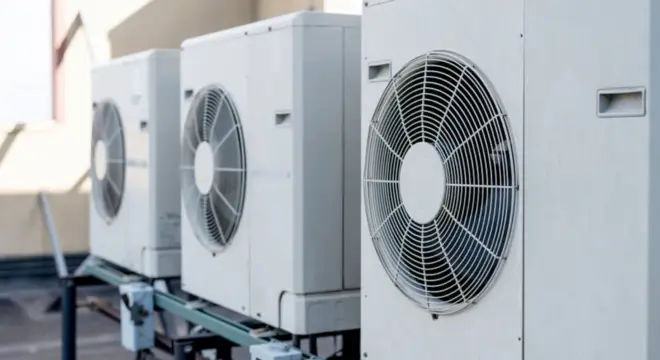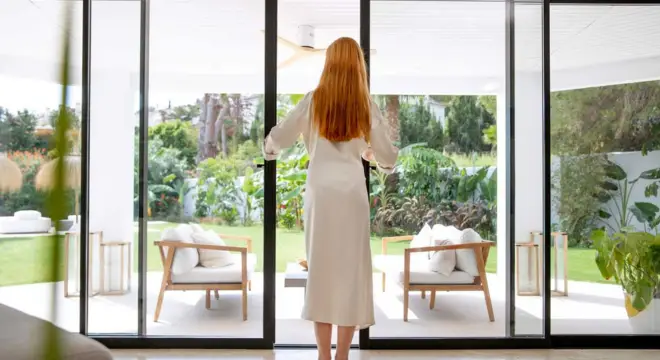How Mini Split Systems Improve Air Quality and Health?
Did you know that indoors, air can be 2-5 times dirtier than outside? While this fact may be surprising, it is more alarming to know that the indoor pollution caused by various allergens and health hazards is growing. As more consumers head toward a healthier indoor space, the demand for air purifiers has increased.
Everyone knows about mini-split systems when it comes to heating and cooling very well. Little did anyone know that this form of doing things has the added benefit of an advanced air purifier. In this article, we’ll delve into how these systems work, explore their advantages, and help you determine whether they’re the right solution for improving your home’s air quality.
What is a Mini Split System?
Mini-split air-conditioning systems are ductless heating and cooling systems for home use. They usually consist of an outdoor unit and one or more indoor units, allowing flexible and efficient temperature control.
Mini splits are known to be energy-efficient because there are no losing ducts, and you can heat or cool individual rooms instead of an entire house. Most mini splits also include purification features for cleaning unwanted allergens and pollutants for having cleaner and healthy air indoors.
How Do Mini Splits Purify Air?
a. Built-in Air Filtration Systems
Every mini-split system is usually equipped with built-in filters for the purification of the air, including some of the following filter types: HEPA filters, which can trap relatively smaller particles like dust and pollen; carbon-type filters that eliminate odour; and electrostatic ones trapping allergens. They work to trap unwanted particles and allergens from the air to result into a healthier home environment.
b. Advanced Air Purification Technologies
In addition to basic filters, many mini splits incorporate advanced technologies for deeper purification:
- PHI (Photohydroionization): This technology breaks down harmful substances like bacteria, mold, and VOCs (volatile organic compounds), improving air quality.
- Ionization: This method removes microscopic particles by charging them, causing them to stick to nearby surfaces or be removed by the filter.
- UV-C Light: UV-C light kills germs and bacteria, helping to prevent airborne diseases and ensuring cleaner air.
c. How Mini Splits Remove Allergens and Pollutants
During operation, mini splits continuously circulate air through their filtration systems, capturing dust, pollen, and other allergens. This ensures that the air in your home remains clean and fresh. However, it’s important to regularly clean or replace the filters. Neglecting filter maintenance can lead to poor air quality, mold growth, and even foul odors, which are linked to respiratory issues. Proper upkeep is essential for ensuring that your system continues to purify the air effectively.
For more on how neglecting HVAC maintenance can lead to mold and air quality problems, check out this article on 5 Hazards with HVAC Systems You Can Avoid. You can also learn more about detecting and preventing mini split malfunctions in this guide to mini split problems
Benefits of Mini Splits for Air Purification
Improved Indoor Air Quality
Mini split systems help significantly improve indoor air quality by reducing allergens, dust, and volatile organic compounds (VOCs). With their built-in filtration systems, they trap harmful particles and create a healthier living environment.
Integrated Solution for Heating, Cooling, and Purification
Mini splits offer a space-saving, all-in-one solution for temperature control and air purification. By combining heating, cooling, and air filtering into one system, they eliminate the need for multiple devices, making them a convenient choice for homeowners.
Low Maintenance Compared to Standalone Air Purifiers
Unlike standalone air purifiers that require constant filter changes and maintenance, mini split systems are relatively low maintenance. Regular cleaning of the filters and occasional professional servicing are usually enough to keep the system running smoothly.
Cost-Effective in the Long Run
While the initial installation cost may be higher than traditional systems, mini splits are cost-effective in the long term. They help reduce energy consumption due to their efficiency, and with their air purification capabilities, you may save on additional air purifiers and other air quality systems.
Safety Concerns and Recent Incidents
Electrical Fires and Hazards
Mini split systems, like any electrical appliance, come with safety risks. A recent recall of 12,000 Daikin, Amana, and Goodman mini split units was issued due to fire hazards. These units were found to have electrical issues that could potentially lead to fires if not addressed.
It’s important to monitor and maintain your mini split systems to reduce the risk of electrical malfunctions. For more details on the recall, you can read the full announcement from the U.S. Consumer Product Safety Commission.
Refrigerant Leaks
Burning refrigerants are another downside to mini split systems. A poorly maintained system could leak refrigerants having the risk of serious fire and explosion. Regular maintenance and prompt repair are necessary to ensure proper containment of refrigerants in a system and safety in operations. Neglect can lead to dangerous situations, especially where older units or improperly installed systems are involved.
Weather-Related Damage
Mini split systems are very much susceptible to weather damages. Flooding, for instance, can cause electrical and functional damages, especially when the flood water gets into the electrical components of the system. Protection of mini split units from extreme weather, such as flooding or very heavy rain, is needed to avoid unnecessary costs caused by repairs and safety hazards.
Improper Installation Risks
Improper installation can lead to a variety of issues including short cycling (where it turns on and turns off frequently) or overheating. A poorly sealed refrigerant line is typically one of the most common issues that would create some form of shift inefficiency or possibly damage it. Thus, the above-mentioned problems could be prevented by requiring a certified professional to install your system fairly efficiently.
Limitations of Mini Splits for Air Purification
- Not All Mini Splits Include Advanced Air Purification Systems: Most mini split units come with basic air filtration; not all, however, include advanced purification technologies. A user must thus select a specific model, which includes HEPA filters, ionization, or UV-C light, for the best air quality.
- May Not Be as Effective as Standalone Air Purifiers: They reduce allergens and dust, but they don’t work as good as air purifiers that are dedicated for some particulates, such as tobacco smoke or strong chemical smells. Consider standalone air purification in conjunction with your mini split system if these are your concerns.
- Dependence on Proper Cleaning and Maintenance: Cleaning and maintenance should continuously be a requirement of the mini split system. Such neglect makes it less able to Purify indoor air. Pollution or allergen contamination would bring about poor indoor air quality and performance if filters have not been changed at the proper time or cleaned regularly.
Mini Splits vs. Standalone Air Purifiers
| Feature | Mini Split Systems | Standalone Air Purifiers |
| Air Circulation | Whole room (via ducts) | Localized (single area) |
| Pollutants Removed | Dust, pollen, allergens | Specific VOCs, odors, heavy smoke |
| Cost | High upfront, long-term savings | Lower upfront, frequent filter replacements |
| Maintenance | Annual cleaning | Frequent filter changes |
Which One Is Right for You?
Choosing between a mini split system and a standalone air purifier depends on your specific needs:
- Mini Split Systems are fantastic if you are looking for a complete and permanent solution for heating and cooling your room along with air filtration benefits. The systems are great at purifying the air for larger spaces or across an entire house. However, it requires a heavier initial investment and regular maintenance for keeping the air clean.
- Air purifiers that can be used singly work best for air purification on a target in smaller areas or rooms. Although these can be bought for a low initial cost, they need frequent filter replacement. They are effective in terms of air purification under specific pollutants such as smoke, strong odors, or VOCs, which might not be effectively addressed by air purifiers built into mini splits.
How to Choose a Mini Split with Air Purifier Features
Look for Specific Features
When shopping for a mini split system with air purification capabilities, consider these essential features:
- HEPA or Multi-Stage Filtration: HEPA filters are highly effective at removing fine particles like dust, pollen, and allergens. Multi-stage filtration systems add an extra layer of purification, often combining HEPA with activated carbon or electrostatic filters for comprehensive air cleaning.
- Advanced Technologies: Look for systems that incorporate advanced air purification technologies such as UV-C light, which kills bacteria and germs, or ionization, which removes microscopic particles. These technologies can enhance the purification process, making your indoor air healthier.
- Energy Efficiency Ratings (SEER): The Seasonal Energy Efficiency Ratio (SEER) rating indicates the efficiency of your mini split system. Higher SEER ratings mean lower energy consumption and long-term savings, which is important for both cooling/heating and air filtration performance.
Recommended Brands/Models
Several brands are known for offering mini splits with strong air purification features:
- Mitsubishi Electric: Known for their high-quality filtration systems and energy-efficient units, Mitsubishi mini splits often come with advanced features like multi-stage filtration and UV-C technology.
- Fujitsu: Fujitsu mini splits offer excellent air purification systems with HEPA filters and ionization, designed for cleaner indoor air and efficient performance.
- LG: LG’s mini splits provide both cooling and air purification with advanced filtration systems and energy-saving options.
Cost vs. Benefit Analysis
Mini splits with air purification features generally have a higher upfront cost compared to standard models, with prices ranging from $1,500 to $5,000 or more, depending on the brand, model, and features.
However, their long-term benefits, including lower energy bills (thanks to higher SEER ratings) and the added convenience of both air purification and climate control, often make them a cost-effective choice in the long run. Additionally, investing in a mini split with built-in air purification reduces the need for standalone air purifiers, further saving money and space.
Maintenance Tips for Mini Splits with Air Purification
1. Cleaning and Replacing Filters
Regular filter maintenance is key to keeping your mini split system running efficiently and maintaining air quality.
How often?
- Air filters should be cleaned every 1-3 months, depending on usage and air quality. If you live in a dusty environment or have pets, you may need to clean them more frequently.
- HEPA filters should be replaced every 6-12 months, while carbon or electrostatic filters may need replacement every 6 months to a year. Always refer to your manufacturer’s guidelines.
Why does it matter?
Dirty filters can block airflow, reducing system efficiency and air purification. Over time, neglected filters can also harbor mold, dust, and bacteria, which may worsen air quality and lead to odors or health issues
2. Professional Servicing for UV-C Lights or PHI Modules
While homeowners can handle basic filter cleaning, UV-C lights and PHI (Photohydroionization) modules require occasional professional servicing. These advanced air purification technologies are delicate and need to be inspected and cleaned regularly to maintain their effectiveness.
How often?
Have UV-C lights and PHI modules professionally checked once a year to ensure proper functioning and avoid damage.
3. DIY Maintenance Tips for Homeowners
If you’re comfortable with basic upkeep, here are a few DIY maintenance tips to keep your mini split in top shape:
- Turn off the system: Always turn off power to the unit before performing any cleaning or maintenance to avoid electrical hazards.
- Clean the indoor unit: Use a soft cloth or vacuum cleaner with a brush attachment to remove dust from the vents and coils.
- Check the drainage: Ensure the drainage pipe is clear of obstructions. This helps prevent water from building up and causing mold growth or leaks.
- Inspect the outdoor unit: Clear any debris such as leaves, twigs, or dirt from the outdoor unit to ensure proper airflow.
- Safety precautions: If you’re unsure about handling electrical components or servicing advanced air purification technologies, it’s best to leave that to a professional.

Maintenance and Installation Tips
Proper maintenance is essential for keeping your mini split system running efficiently and ensuring good air quality:
Maintenance Must-Dos
- Clean Filters Monthly: Regularly cleaning your filters—ideally once a month—helps prevent the buildup of dust, allergens, and mold. Neglecting this step can lead to poor air quality and increased risks of respiratory issues. For more on maintenance tips, visit Collier’s Heating & AC.
- Schedule Professional Servicing Annually: It’s important to have your mini split serviced by a professional once a year. This helps identify and resolve potential electrical or refrigerant issues before they become major problems. Regular servicing will also keep the advanced air purification technologies (like UV-C lights or PHI modules) functioning properly.
Safe Installation
To ensure the safe and efficient operation of your mini split, always hire licensed technicians for installation:
- Proper Electrical Connections: A licensed technician ensures that the electrical connections are correctly installed, reducing the risk of electrical hazards or fires.
- Refrigerant Handling: Proper refrigerant handling is crucial for both efficiency and safety. Professionals will ensure that the refrigerant is installed correctly, reducing the risk of leaks or system malfunctions. For reliable installation tips, check out Efficient Mini Splits.
FAQs
1. Can mini splits remove pet odors?
Yes, mini splits with advanced filtration systems (such as activated carbon filters) can help reduce pet odors by trapping airborne particles and neutralizing odors. However, for stronger pet odors, using a system with a combination of filtration and air purification technologies like UV-C or ionization may offer better results.
2. How often should I clean the filters?
It’s recommended to clean the filters every 1-3 months, depending on usage and air quality. If you have pets or live in a dusty environment, cleaning them more frequently is advised. Keeping the filters clean helps maintain good airflow and optimal air quality.
3. Are mini splits safe for people with asthma or severe allergies?
Yes, mini splits with HEPA or multi-stage filtration can help remove allergens like dust, pollen, and pet dander, making them a good choice for people with asthma or severe allergies. However, regular maintenance of the filters is crucial to ensure they continue to perform effectively.
4. Do all mini splits come with air purification systems?
No, not all mini split models include air purification systems. Some basic models only provide heating and cooling. To ensure air purification features, look for systems that offer advanced filtration technologies, such as HEPA filters, UV-C lights, or PHI modules.
5. Can a mini split purify air in a large house?
Mini splits can purify air in a specific room or area, but to effectively purify air throughout a large house, you may need multiple units or consider using additional standalone air purifiers. For larger spaces, look for multi-zone mini splits that allow you to control air quality in several rooms.
Conclusion
Mini splits offer more than just heating and cooling—they improve air quality by removing allergens and pollutants with advanced filtration. They are energy-efficient, multifunctional, and beneficial for health.
Evaluate your air purification needs and choose a mini split that fits your space and requirements. With the right system, you can enjoy cleaner air and greater comfort at home.


